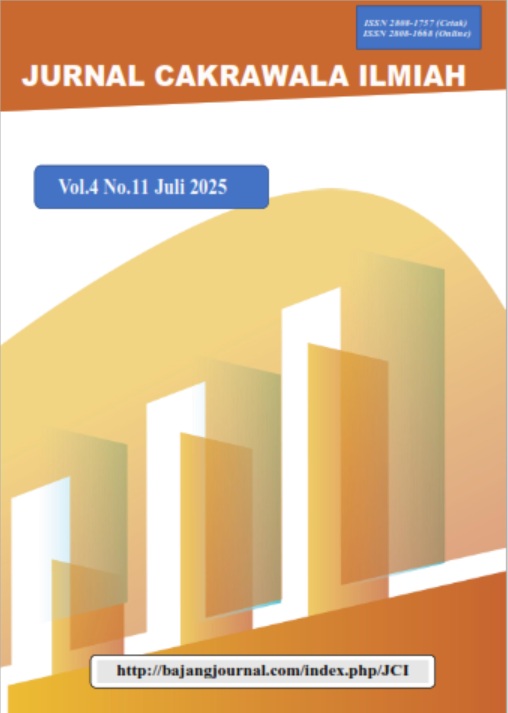PENGGUNAAN BAHASA INDONESIA DALAM DUNIA DIGITAL DAN EFEKNYA TERHADAP TATA BAHASA
Keywords:
Indonesian, Digital era, Globalization, Social media, Young generation.Abstract
The focus of this study is the influence of the digital era and globalization on the use of Indonesian among the younger generation, consisting of students, college students, and active social media users. The main objective of this study is to find changes in language structure, perceptions of standard language, and linguistic and cultural issues that arise as a result of the spread of digital content, social media, and e-commerce. This research focuses on language use on social media platforms such as TikTok, WhatsApp, and Shopee, and includes social media users of various ages, schools, and urban communities. The methodology used includes descriptive qualitative studies, quantitative surveys, hermeneutics, and systematic literature reviews (SLRs), with data models including interviews, observations, online questionnaires, and digital content analysis. The results of the study show that the use of Indonesian is increasingly eroded by the dominance of foreign languages and informal styles. This can have a negative impact on students' mental health and character and reduce their understanding of standard language. However, the younger generation still realizes the importance of maintaining Indonesian. Therefore, language literacy strategies and digital education are very important to ensure the sustainability of the language amidst the flow of globalization.
References
Alika, S. D., Dewi, A. P., Anggara, I. R., Shabrany, R. H., & Madhasatya, S. Y. (2022). Urgensi Penggunaan Tata Bahasa yang Baik dalam Berkomentar di Aplikasi Media Sosial Tiktok Terhadap Kesehatan Mental dan Pembentukan Karakter pada Siswa SMP dan SMA. Jurnal Paedagogy, 9(3), 400–409. https://doi.org/10.33394/jp.v9i3.5312
Ashadi, F. N., Putra, G. P., Artika, S. U., & Salsabila, T. A. (2024). Pengaruh Konten Tiktok Terhadap Penggunaan Bahasa Indonesia Sesuai E.Y.D Di Aplikasi Whatsapp Pada Remaja Di Bandung. Filosofi, 1(2), 198–207. https://doi.org/10.62383/filosofi.v1i2.102
Fadhilah, A. N., Nikmah, N. F. A., Hermanto, A. S., Balqis, A., Falda, T. A. R., & Arum, D. P. (2024). Penggunaan Bahasa Indonesia dalam Pemasaran Digital E-Commerce: Studi Kasus Iklan Shopee. Jurnal Bahasa Daerah Indonesia, 1(2), 1–14. https://doi.org/10.47134/jbdi.v1i2.2355
Hilmi, B., Saputra, H. R., Hidayah, S. S., Suwardana, R. T., & Purba, Y. P. (2023). Penggunaan Bahasa Indonesia Warga Sekitar Yang Dapat Berpengaruh Dalam Lingkungan Sosial Dan Budaya. Simpati: Jurnal Penelitian Pendidikan dan Bahasa, 1(3), 149–159. https://doi.org/10.59024/simpati.v1i3.230
Manihuruk, F. E., Alisya, J., Angkat, F., & Lubis, F. (2023). Dinamika Perubahan Bahasa Indonesia di Era Digital: Tantangan Media Sosial Terhadap Generasi Muda. Prawara: Jurnal Pendidikan Bahasa dan Sastra Indonesia, 4(2), 140–146.
Nukman, M., Nursalim, M., & Rahmasari, D. (2024). Dampak Era Digital Terhadap Perkembangan Bahasa Anak Usia Dini: Literature Review. Jurnal Review Pendidikan dan Pengajaran, 7(1), 284–289.
Rasyad, M. I. H., & Annoval, K. D. (2023). Penggunaan Bahasa Indonesia di Media Sosial. Universitas Islam Bandung.
Sari, I., & Medaline, O. (2018). Kecenderungan Penggunaan Bahasa di Media Sosial Ditinjau dari Undang-Undang ITE Tahun 2008. Jurnal Ilmiah Skylandsea, 2(2), 41–45.
Simanullang, H., Simarmata, P. S., Pasaribu, A., Nazira, & Daulay, M. A. J. (2024). Penggunaan Media Digital dan Dampaknya terhadap Perkembangan Bahasa Indonesia pada Generasi Z: Sebuah Tinjauan. IJEDR: Indonesian Journal of Education and Development Research, 2(2), 1419–1425.
Tambunan, A. B. P., Sihombing, A. S. R., Kanna, C., Pasaribu, G. A. P., & Sormin, R. E. (2025). Analisis Penggunaan Teknologi Digital dalam Perkembangan Bahasa Indonesia di Kalangan Remaja. Jurnal Pengabdian Masyarakat dan Riset Pendidikan, 3(4), 1146–1150. https://doi.org/10.31004/jerkin.v3i4.619
Downloads
Published
How to Cite
Issue
Section
License
Copyright (c) 2025 Jurnal Cakrawala Ilmiah

This work is licensed under a Creative Commons Attribution-NonCommercial 4.0 International License.
















